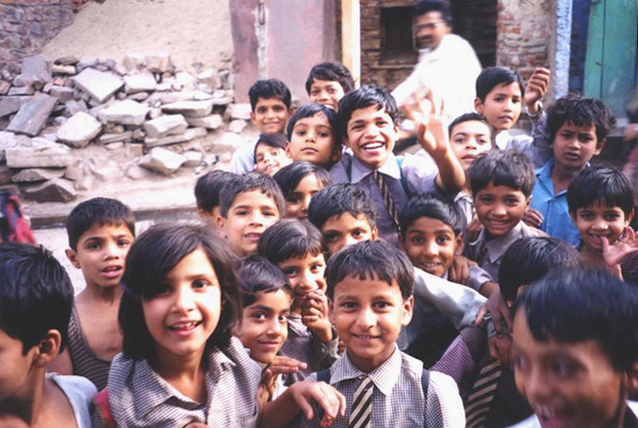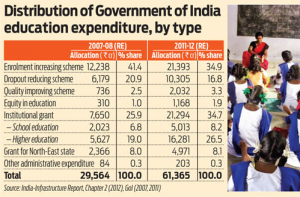R N Bhaskar
6 January 2014
The government of India likes to claim it is committed to uplifting its people. But, sadly, most numbers point towards a different direction.
Consider the table alongside. Even a cursory glance will show you that the government was more concerned about increasing enrollment than in improving the quality of primary education.
Improving enrollment accounted for an expenditure outlay of Rs 21,400 crore, but the expenditure outlay for quality improvement was (in comparison) a paltry Rs 2,000 crore.
Delve a bit deeper and you will discover that both “enrollment increasing” and “dropout reducing” witnessed a percentage fall in financial outlay. “Enrollment increasing” fell from 41% to 35% from 2007-08 to 2011-12. “Dropout reducing” too saw a decline from 21% to 17% during the same period. What could have caused these dips?
The ‘eureka’ moment is not long in coming. The percentages declined, because the Right to Education (RTE) Act made schooling compulsory on the one hand, and also mandated an automatic promotion policy up to Std VIII. Enrollment was therefore guaranteed. Dropout was not even considered, because any child, who does not attend school at all, must now get admitted to the next higher class. Under the RTE Act, such a child has to be admitted to a class appropriate to his/her age, not intellectual growth or comprehension capability. It is quite another matter that the presence of a ‘dimwit’ in a classroom could adversely affect the learning process for other brighter and keener students.
Consequently, the RTE Act will now allow the government to tell the world that it had met the education related Millennium Development Goals (MDG) of the United Nations. India’s policy-makers could now sport the look of smug satisfaction of having “improved” school enrollment.
True, the percentage spending on quality did go up marginally from 2.5% to 3.3% over the same period. But the amounts involved are so meagre, that there is no way they could have made any difference. Moreover, how do you preserve quality, if the teacher is not allowed to filter out students who are not even interested in learning and could possibly disturb the rest of the class? But then, the ministry was obviously interested in numbers; not in learning, right?
But people often forget that if the quality of education is good, employers end up growing their businesses faster. Ask employers, and they will tell you that the biggest handicap to growth is the non-availability of good talent. Quality-education, thus, becomes its own “increasing enrollment” driver.
So, is there a way out? Yes. Several things can easily be done. Some have been outlined earlier (http://www.dnaindia.com/analysis/main-article-a-letter-to-kapil-sibal-1344735 and http://www.dnaindia.com/money/report-policy-watch-education-system-promotes-non-inclusive-growth-1939390). But most critical is to reorient focus on quality of education at the primary school level. Policy-makers must remember that good college education cannot make up for 10 years of bad schooling. This may look expensive, but the cost of freebies at the cost of quality can turn out to be a lot more expensive.
Most important, it is time to throw out some of the obnoxious clauses in the RTE Act. The only key clause that matters is that school education should be a fundamental right. To aid the underprivileged, instead of reserving 25% of seats in all schools, just allow good schools to take over bad schools along with their assets. That will make education a lot more meaningful.
One more thing: It is important to remember that good students have a right too – to be allowed to study without being distracted, and without having standards of education diluted just because someone does not want to become competitive in this harsh world of today and tomorrow. If we forget those rights, we will end up sacrificing the future of an entire nation on account of populism and impressive numbers.
The author is the Consulting Editor of DNA.
Read the original article here.






































COMMENTS